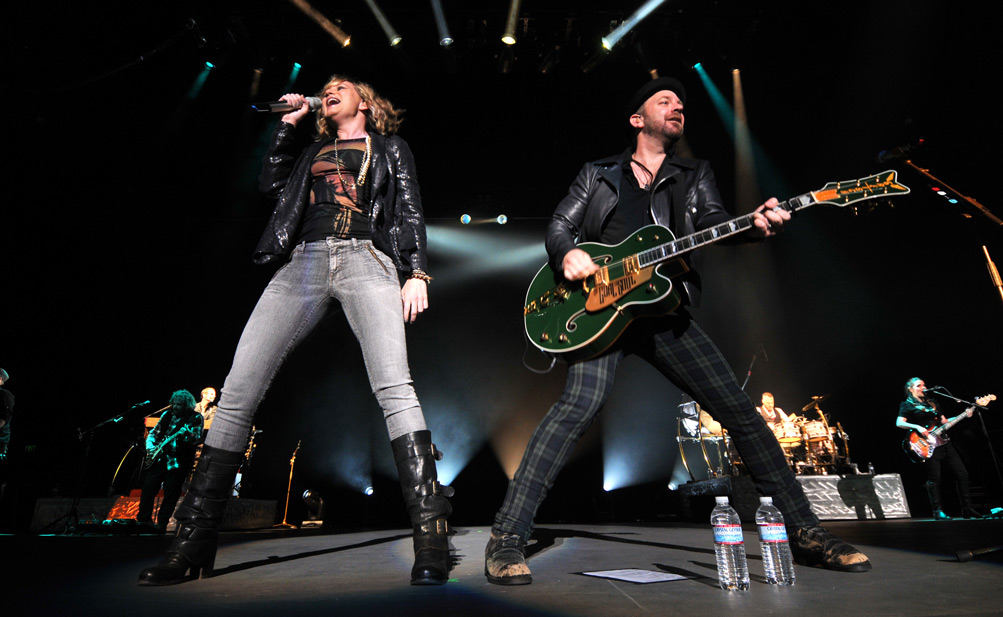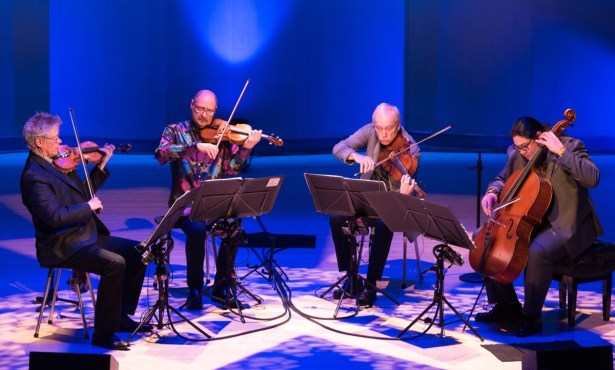Sugarland Returns from Five-Year Hiatus
Kristian Bush Talks Solo Projects and Reuniting with Jennifer Nettles

“It was very interesting for me because in country music, no one had really been exposed to my singing voice. So, in a lot of ways, I was a surprise,” said Kristian Bush, singer/songwriter/guitarist of the Grammy Award–winning duo Sugarland, in reference to his 2015 debut solo record, Southern Gravity. The record, which spawned the single “Trailer Hitch,” was created during the band’s five-year hiatus, which Bush and Sugarland’s lead singer, Jennifer Nettles, took to pursue personal projects. In addition to his album, Bush wrote original songs for playwright Janece Shaffer’s musical Troubadour, which made its debut at the Alliance Theatre in Atlanta on January 28, 2017. For her part, Nettles released three solo records — That Girl, Playing with Fire, and To Celebrate Christmas — and started a family.
Despite their promise that the break was only temporary, many folks questioned whether or not the pair — Bush and Kristen Hall formed Sugarland in 2002; Nettles joined in 2003, with Hall departing in 2006 — would actually reunite. “I think it’s fun now that the conversation is back to one of trust,” said Bush. “Because people really were distrustful of our hiatus. We got a lot of people asking for more drama than was actually there. Now it’s, ‘Remember when we told you we would [get back together]? Well, we’re doing it. And [now] there’s this kind of joyful moment in the middle of the set where we start playing our solo stuff.”
Nettles and Bush resurrected Sugarland in 2017 and are currently on their Still the Same tour, which will keep them on the road until September. In early 2018, they recorded their sixth studio album, titled Bigger, which drops on June 8. “We wrote the record … in about nine days,” said Bush in a phone interview with the Santa Barbara Independent. “And we recorded it in about four. What you’re getting is very topical music.”
Why do you think people were skeptical about Sugarland’s break? Well, it’s not as common in country music as it is maybe in pop music, rock music. It’s very common to own an Eddie Vedder record and a Pearl Jam record. Or a Stone Gossard record. And it doesn’t seem to faze anybody when [Death Cab for Cutie’s] Ben Gibbard does something as Ben Gibbard. But boy, the moment you step out of your machinery in the country music world, people are like, “Why are you doing that? What’s going on?”
Why do you think that is? I really don’t. … [But] we did it and I think people will be so much more comfortable now, you know? Because I’m sure we both plan to make more [solo] music in our lives.
How was it when you reunited? Was it just like getting back on a bike, as they say? It was not just getting on a bike; it was like getting back on the bike and suddenly it’s a motorcycle.
Because you brought new experiences to your collaboration? Yeah.
Did you keep in touch during your hiatus? We did, but not a lot … We did human things, like when my dad passed away and she called me. You know, she fell off the stage, and I was like, “Are you okay?” Things like that.
You two have had a long friendship and working relationship. We joke with each other that we’ll be the most dependable partner the other one will ever have.
What is it that makes your dynamic work so well? I think it’s a complementary set of skills. I don’t think we’re stepping on top of each other. And I think it’s because we’re fans of each other. What I would consider my weakness, she considers my strength.
What would you consider your weakness? You know, if I’m in a band with Jennifer, my weakness is my voice …. But what she says to me is, “Look, the coolest thing is when you start singing, people immediately stop what they’re doing. They’re like, ‘What is that?’ You have a character voice. I can’t do that. I can’t make my voice do what your voice does.” In return, I have melodies dripping out of my head every day, and I can make records in an hour. I’ve written songs in the amount of time that it takes to play [them]. Just out of thin air like it’s jazz or something, and it’s really strange. And it freaks out my friends and my partners.
I read that you wrote 300 songs for your last solo record. Yeah. It was weird.
How did you pick which songs to put on the album? It’s hard because there were so many records inside that record. I didn’t rewrite one song 15 times. They were all different. I guess it was a question of “Who do I want to be?”
And what did you decide? Well, what I decided is that, as a band, you spend 10 years writing your first record, and no one ever sees the 10 years. But you’ve been playing out for five years and people like the following six songs. They sing them back to you, so you choose those [for the album]. I was not afforded that space. I had eight months, or 12 months, to figure out if I was going to start from scratch. … So I compressed 10 years’ worth of being a band into my solo career in one moment, so that when I popped out with the first record, it sounds like the energy of a first record. I’ve got to convince strangers to sing along.
You seem to have many projects going at once. It’s really cool. I make things. I got lucky enough to be a part of my first musical this year and a half. I wrote a musical out of nowhere.
How was that? It was weird. A famous playwright [Janece Shaffer] from Atlanta called me and asked me if I would write one song for her play. And I said sure. It can’t be much different than writing a song for a movie, and I do that all the time. So I met with her. She told me the story [and] gave me the script, and I kind of wrote a song at the table while we were eating breakfast. I was like, pardon me, I need to sing into my phone. I finished it that day and sent it to her. And she flipped out and she was like, This is great. … The director of the Alliance Theatre heard these songs and knew about the script. And said, let’s do a table read. Because you know, Atlanta is now full of all these movie stars because this is where everybody films. So we had a star-studded table read. … I’d never been to anything like this. [When it ended], the artistic director turned to me, and she said, “How do feel about writing some more music?” And I said, Why? She said, “I think this is a musical.” So within six or seven months, I wrote the other 16 songs. And then it debuted and it … was super successful.
Clearly you are superhuman when it comes to writing songs. It’s writing on request is the interesting part. And I love doing that. That’s what I do even in my own band, you know? Like here’s the idea. And I’m like, Ooh, I bet it goes like this.
Do they call you Rain Man? Well, no. But now we’re smart enough to hit record every time we get in it.
4·1·1
Sugarland plays Tuesday, June 12, 6:30 p.m., at the S.B. Bowl (1122 N. Milpas St.). Call 962-7411 or see sbbowl.com.



